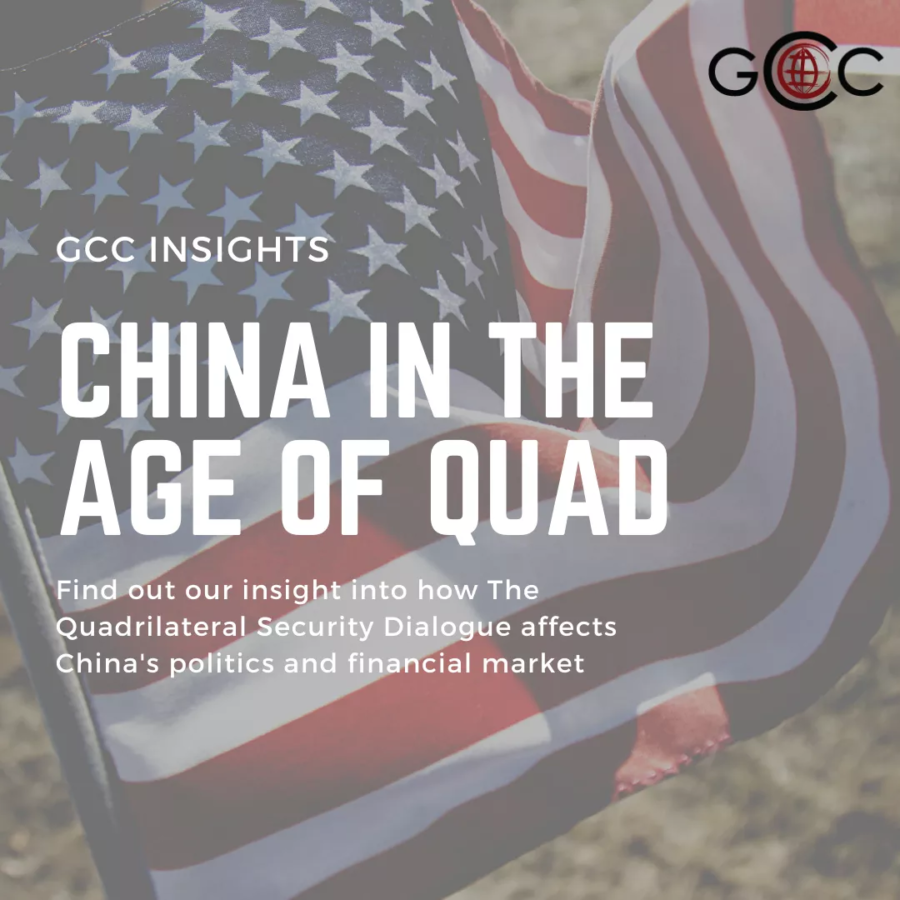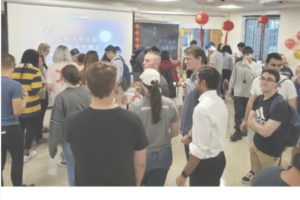Abstract
The Quadrilateral Security Dialogue, known as the Quad, is a multilateral dialogue between the United States, India, Japan, and Australia. It was first initiated by Shinzo Abe, the former Prime Minister of Japan, in 2007, aiming to create a democratic alliance against China’s increasing economic and military power. However, the Dialogue ceased in 2008 upon Australia’s retreat under Prime Minister Kevin Rudd due to its close economic partnership with China.

Photo credit:thehansindia.com
The Quad alliance was brought back to life under the Trump administration during the 2017 ASEAN Summits, which led to heightened tensions between Quad members and China. In 2020, Australia joined the Malabar naval exercise along with other three member states for the first time in 13 years, signaling a de facto creation of a military alliance between QUAD members. Recently, the Quad Summit took place on 12 March, 2021 virtually, joined by US President Joe Biden, Japanese Prime Minister Yoshihide Suga, Australian Prime Minister Scott Morrison, and Indian Prime Minister Narendra Modi.
Three prominent themes came up during the Summit for the creation of new working groups, namely vaccine, technology, and climate change. In the meantime, maritime security and territory disputes in Indo-Pacific region were also discussed. Although China was not directly mentioned, the Summit has caught China’s attention.
01 Vaccine
The most key project announced by the Quad was its vaccine initiative. The Quad leaders claimed cooperation in COVID-19 vaccine manufacturing and vaccine distribution to lower-income countries in the Indo-Pacific in a way to combat China’s vaccine diplomacy. It is recorded that the US will contribute US$100 million, with Australia $77 million and Japan $41 million, to support the global vaccine chain and health system (The White House). The Quad aligned themselves with international organizations like the WHO and COVAX to further strengthen the bonds. Following the Summit, Indian Foreign Secretary Harsh V. Shringla confirmed that India would produce 1 billion dose Johnson & Johnson vaccines, with the financial support from the US and Japan, as well as logistics from Australia (Rej, 2021) by 2022.

Photo from:nbcnews.com
Despite the perceived political strategies behind the initiative, there are some positive sides about the vaccine collaboration. First of all, it draws joint effort from the developed countries to apply their capabilities and resources, i.e. finance, experts, technology, etc. to help address the global challenge of the COVID-19 pandemic. In addition, since the Quad leaders emphasized that they would work closely with the WHO and COVAX, it helps build up the legitimacy of these international institutions and encourage global cooperation within due mechanisms. (Mandan, 2021)
02 Technology
The global shortage of microchips and the race on 5G development has been exacerbating rivalries. The Summit stressed that critical technology should be governed and operated under shared interests and values. Therefore, a Critical and Emerging Technology Working Group would be assembled to facilitate coordination on monitoring and developing telecommunications between its member states (The White House).
Even before the Quad Summit, the US and India have already proposed new limits on China’s telecom provider Huawei (Dan, 2021). The Biden administration restricted companies from selling components like semiconductors, antennas, and batteries to Huawei to restrain its growth. From the Indian side, it is likely that India will ban two of its major telecom carriers-Bharti Airtel and Vodafone Idea-from using Huawei gear. Huawei may be adopted by the Quad as a bargaining chip with Beijing, said Ma Jihua, a telecoms industry analyst (Dan, 2021).

The joint Quad statement read “We bring diverse perspectives and are united in a shared vision for the free and open Indo-Pacific. We strive for a region that is free, open, inclusive, healthy, anchored by democratic values, and unconstrained by coercion.” The statement in general was quite gloomy when it came to the issue of maritime security. It indicated that its collaboration including in maritime security is to meet challenges to the rules-based maritime order in the eastern south china seas.
The Sino-Indian border dispute which has been prominent in recent times, was expected to be strongly condemned by India. After all, India had taken a leading role in resisting China for instance, by banning hundreds of apps which was unlike the political giant’s political narrative of being neutral. Shringla, India’s top diplomat, mentioned “contemporary issues of Indo-Pacific were discussed” however, with no specifics. Prime Minister Modi, who described the Quad as an important mark to stability in the Indo-Pacific region, did not go into specifics either. From the American end, National Security Advisor Sullivan claimed that the Quad was not a military alliance, nor ‘NATO despite some of the propaganda out there’. “What it is, is an opportunity for these four democracies to work as a group and with other countries on economics, technology, climate, and security,” said the senior official.
03 Climate Change
Climate change is another big challenge that has been brought up. The Quad stated that the issue remains a global priority and will work to strengthen global efforts in accordance with the Paris agreement. When put into comparison with the USA, China’s carbon emissions are double. However, per capita, the USA is the largest contributor to the declining climate. Climate change is one key area where Quad’s supposed protection of the Indo-Pacific region will be tested as cooperation with China here is vital.
China’s reaction to the Quad has been clear and simple. In a regular press conference, Foreign Ministry Spokesperson Zhao Lijian emphasized the importance of having mutual understanding and trust among regional countries instead of polarizing any third party. The indirect mentions of China in the summit’s joint statements are an indication that while the countries may unify in the name of the stated objectives, they are not going to be unwise with their relationship with China. After all, China is the largest trading partner for all four nations and a mutually beneficial outcome in the region would not be possible without cooperation with the economic and geopolitical giant. However, with Covid cases and climate change on the rise, the Quad should put an equal emphasis on these subjects alongside military and economic affairs. More waits to unravel as an in-person Quad summit among the national leaders are expected to take place by the year’s end.
-END-
Author:Jasmine and Darpan
Editor:Tracy Zhou
Reviewer:Jane Zhang
References:
Rej, Abhijnan. “In ‘Historic’ Summit Quad Commits to Meeting Key Indo-Pacific Challenges.” – The Diplomat, For The Diplomat, 13 Mar. 2021, thediplomat.com/2021/03/in-historic-summit-quad-commits-to-meeting-key-indo-pacific-challenges/.
“Fact Sheet: Quad Summit.” The White House, The United States Government, 12 Mar. 2021, www.whitehouse.gov/briefing-room/statements-releases/2021/03/12/fact-sheet-quad-summit/.
Madan, Tanvi, and Adrianna Pita. “What Does the Quad Summit Signal for U.S. Engagement in the Indo-Pacific?” Brookings, Brookings, 17 Mar. 2021, www.brookings.edu/podcast-episode/what-does-quad-summit-signal-for-u-s-engagement-in-the-indo-pacific/.
Times, Global. “Huawei May Become a Bargaining Chip at Quad Meeting Following Reportedly New US, Indian Bans: Experts.” Global Times, www.globaltimes.cn/page/202103/1218187.shtml.
“First Quad Summit: One Billion Vaccine Doses For Asia, Cooperation on Approach to China.” The Wire, thewire.in/diplomacy/first-quad-summit-vaccine-asia-chinese-activities.
Haidar, Kallol Bhattacherjee & Suhasini. “First Quad Summit: Quad Leaders for ‘Open, Free’ Indo-Pacific.” The Hindu, The Hindu, 16 Apr. 2021, www.thehindu.com/news/national/first-quad-summit-meeting/article34054156.ece.
“Quad Leaders’ Joint Statement: ‘The Spirit of the Quad.’” The White House, The United States Government, 12 Mar. 2021, www.whitehouse.gov/briefing-room/statements-releases/2021/03/12/quad-leaders-joint-statement-the-spirit-of-the-quad/.
Foreign Ministry Spokesperson Zhao Lijian’s Regular Press Conference on March 12, 2021, www.fmprc.gov.cn/mfa_eng/xwfw_665399/s2510_665401/t1860582.shtml.









